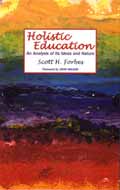|
Teacher Development Program
|
This
program is currently being developed in Portland, Oregon,
in coordination with the planning of our elementary school.
In the meantime, you may read An
Overview for Teachers, to learn more about the entire
field of Holistic Education.
|
Action
Research
Of
the many different kinds of educational research, Action Research
is the only "... research methodology intended to be a
workable technique for working classroom teachers."1
The emphasis is on teachers improving their teaching practice
"by means of their own practical actions and by means of
their own reflection upon the effects of those actions."2
Unlike many other forms of educational research which are frequently
criticized for not being relevant or useful to teachers, or
for using technical and specialized language, Action Research
is about the real-life daily concerns of practicing teachers
seeking real-life solutions and is conducted and described in
terms to which teachers can readily relate. Action Research
also distinguishes itself by claiming that the 'researcher'
can be the 'researched,' that the 'observer' is the 'observed,'
and that rather than simply increasing knowledge, Action Research
is research for action, of action, and in action.
Action
Research usually takes what is often described as a cyclic or
spiral form. Short cycles of reflecting, planning, acting and
observing are repeated (with each new cycle building on the
previous ones), generating what has been called a spiral because
of the increasing focus and clarity of each subsequent cycle.
The cycle has been described as: Reflecting (on the situation)
-> Planning (for an intervention, i.e., some
small change) -> Acting (the intervention) ->
Observing (collecting data, then analyzing data) ->
Reflecting (on the situation - as now revealed by the data)
-> Planning (for a new intervention in view
of the data collected and new reflections) ->
etc. 3 Each teacher starts with
where she/he is, their real situation and their genuine concerns,
and moves through the cycles to genuinely implementable solutions.
A
critical component of the cycle is reflection. Teachers engaged
in Action Research often claim they have benefited enormously
from the structured and sustained reflection that Action Research
entails. Such reflection is frequently done with others (often
in structured ways), and the benefits of this collegial enquiry
are often felt by teachers to be one of Action Research's greatest
rewards. The final research is almost always shared with others
(either in a written form or as presentations).
The
benefits of Action Research are said to accrue to the teacher,
his/her students, and their school. The students benefit as
improvements in their learning are almost always (some would
say always) the focus of the research. Teachers benefit as they
gain a better, more objective and insightful understanding of
their practice. This is very empowering for teachers as it taps
their creativity and shows them how they can look to themselves
and their students' responses for improvements and inspiration,
rather than feeling a need to look to others outside their classroom.
As such, Action Research is felt by many to re-professionalize
teaching at a time when teaching seems so often to be de-professionalized
by forces wishing to prescribe and predetermine all its activities.
Schools naturally improve from such benefits to students and
teachers.
Action
Research has been used extensively in Australia and England
and has gained popularity in the United States over the last
fifteen years. Several universities have departments specializing
in Action Research, and the American Educational Research Association
has a special interest group dedicated to Action Research.
--
|
Program
Overview
Holistic
Education Summary
Action
Research
Courses
Offered
Support
Facilitator
Policy
and Credits
Overview
for Teachers
FAQs
about
Holistic Education
Articles
Teacher
Development Program
Holistic
Education Research
Contact
Us
The highest function
of education
is to bring about an integrated individual who is capable
of dealing with life
as a whole.
-J. Krishnamurti
Recommended
Book:

|